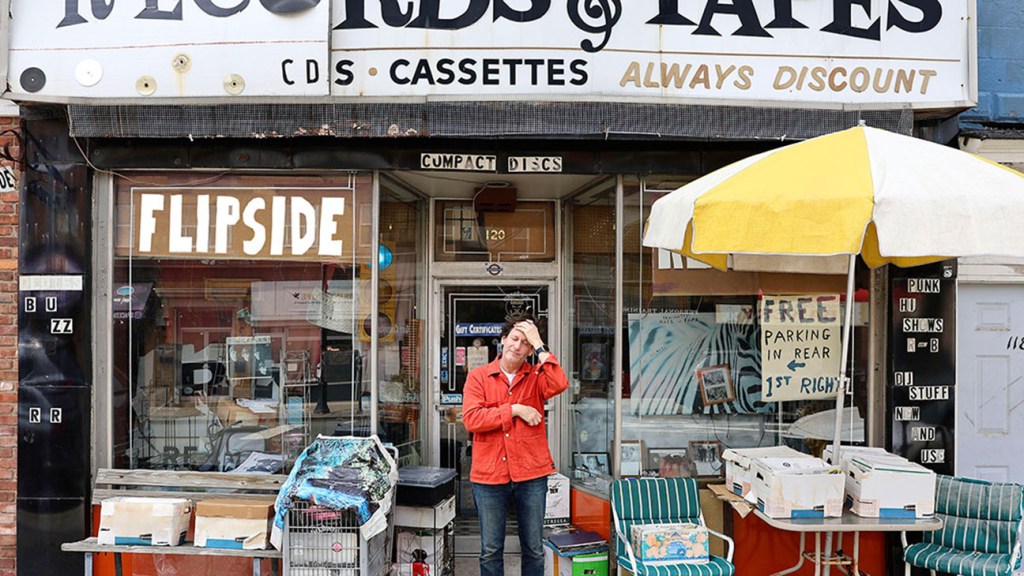
It’s easy to measure your life in accomplishments, to look at the accumulation of honors and accolades, of personal and professional victories, and to say, “This accumulation represents empirical success.”
It’s harder to measure your life not necessarily in failures but in potentials left unfulfilled, in half-completed tasks or the stashed items left unused, and to say, “Despite or perhaps even because of this, there is still success.”
Flipside
The Bottom Line
Plucks something very universal from life’s loose ends.
Chris Wilcha’s new documentary, Flipside, takes on the second challenge to deliver an autobiographical portrait of how a life seemingly of disappointments and failures can be a life well lived. Glimpse Flipside in the wrong moment or from the wrong angle and it can feel a little solipsistic, albeit in a way that will be relatable to many viewers. But taken in totality and with some reflection, it’s a borderline-profound and philosophical expression of satisfaction with everything that is unfinished in life.
Even on paper and without a documentary’s worth of reflection, Wilcha’s life isn’t a failure at all. His first documentary, The Target Shoots First, was acclaimed on the festival circuit and offered a very Gen X look at his youthful attempts to sell out, working for Columbia House in the 1990s. He won an Emmy for helping adapt Ira Glass’ This American Life for TV. Mostly, he’s worked steadily as a commercial director for some of the biggest brands in the world. He seems to have a family suitable for picture frames.
But Wilcha also has piles of hard drives filled with footage from documentaries he never completed, imagined works of art that were shelved for various reasons. All the while, his gainful employment was in glorified marketing. For a storyteller raised in a generation that, at least for a while, found some ideological expression in the no-compromises cynicism of Reality Bites, this feels like disappointment. Wilcha’s father was in marketing and that’s not the path he wanted to follow, even if all signs point to his father being very happy.
The ostensible spine of Flipside is Wilcha’s return to his New Jersey hometown, where he is simultaneously pondering two monuments to the blurred line between collecting and hoarding. There’s his childhood closet, a repository for albums, books, concert shirts and memorabilia of the juvenile he used to be. And then there’s Flip-Side Records & Tapes, a vintage record store where he worked his first job, a struggling repository from a bygone era that’s closer to a museum than a place of retail.
As he struggles to identify the value in his decently organized mess and, through conversations with Flip-Side proprietor Dan and some of Wilcha’s former friends and co-workers, he also goes through footage from some of those unrealized documentaries. And wouldn’t you know it? The values — spiritual, if not financial — all intersect.
Wilcha’s cemetery of truncated projects is an intriguing lot. There are interviews with legendary jazz photographer Herman Leonard — trust me, you know some of his images — conducted shortly before his death. There’s strange material from an Ira Glass touring show in which the host participated in fully choreographed dance numbers.
Then there are the documentaries that could have been started that are adjacent to other unrealized efforts. One of the regular customers at Flip-Side is Uncle Floyd, a television personality and New Jersey icon whose journey has included unexpected connections to Saturday Night Live and David Bowie. Wilcha’s connection to Leonard came through an association with Deadwood creator David Milch, which emerged from Milch’s connection to Judd Apatow, with whom Wilcha worked on a documentary about the making of Funny People. There’s a latticework of editing that joins these unfinished documentaries within Flipside and unites them as facets of Wilcha’s life. The idea that maybe what seem like loose ends from our past are actually plotlines awaiting unexpected resolution is both pleasantly Dickensian and wonderfully uplifting, if you think about it.
You will probably watch Flipside thinking that many of these films, not quite unmade anymore, might be more engaging as a feature than this partial autobiography or the story of a beloved old record store. In particular, the material with Milch, who has Alzheimer’s and is interviewed in conversation with his wife, Rita, and with Apatow, left me hungry for more. That’s also the point. Wilcha thought they would be more engaging as features as well. But the care with which Wilcha uses Milch and Leonard and Uncle Floyd, finding in each of their attitudes and spirits something aspirational without really making it about him, is thoughtful and at times inspiring.
Nobody in Flipside is living exactly the life they dreamt of. Even Apatow, an executive producer here as well, is tied to Wilcha through a movie about the stand-up career he didn’t have. As Leonard puts it, though, “There will always be circumstances.” Whether you overcome those circumstances or adapt to them or find a way to learn from disappointment and move on can be a matter of perspective or determination or luck.
This can be a metaphor for the general pursuit of life, for the specific making of art or for the entirely universal experience of working your way through your clutter and debris and learning to see the treasure in the mess. Maybe you won’t connect with the moments of Flipside that are most about Wilcha, but in 96 minutes, the film makes a case for cobbling something new from whatever your own unused documentary footage equivalent happens to be.













